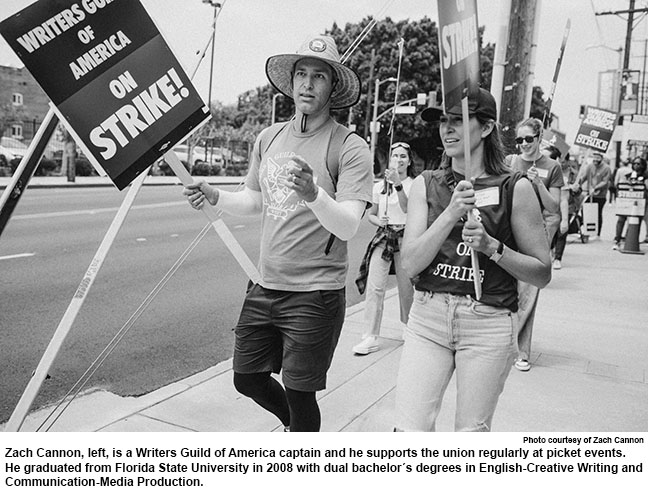Alumnus Zach Cannon established a career in screenwriting; he now captains the fight for a stronger WGA future
Once Zach Cannon graduated from Florida State University in 2008, he did not wait long to jump on his chosen career path.
He earned dual degrees in English-Creative Writing and Communication-Media Production, and he soon moved to New Zealand, landing a job as a runner at Weta Digital, now known as Wētā FX. At the time Cannon joined the company, it was finishing post-production on the first Avatar movie.

“Since returning home, I've hit just about every rung on the assistant ladder in TV writers' rooms,” Cannon says. “I worked as an assistant to NYPD Blue and Deadwood creator David Milch and as a writers' assistant and script coordinator on a handful of shows, including Castle, Dynasty, and Preacher. I participated in the National Hispanic Media Coalition's Series Scriptwriters Program and NBC's Writers on the Verge Program, both of which helped me land my first job as a staff writer for a TV show. I've written for NBC's The InBetween, Syfy's Resident Alien, Roku's Panhandle, and CBS's FBI: Most Wanted.”
That´s stepping on many rungs of the ladder.
Currently, Cannon is a volunteer captain for the Writers Guild of America, a position that functions as a liaison between writing staffs and the WGA, which represents approximately 11,500 screenwriters.
“I wanted to be more involved with and connected to my community of fellow writers,” he says.
Since 12:01 a.m. on May 2, Cannon´s role as captain has put him at the forefront of the ongoing WGA strike. The labor dispute pits the WGA against the Alliance of Motion Picture and Television Producers, with the main disagreements focused on residuals from streaming media and the use of artificial intelligence tools to help with script ideas. The WGA wants to limit that use to research or generating script ideas, with the promise that the tools will not replace the writers.
Cannon is planning and has posted a tweet about an FSU alumni picket event for Thursday, July 13 at Walt Disney Studios in Burbank, California. He recently participated in an email interview to answer questions about the strike and his role in the process as well as questions about his time as a student at FSU.
How long have you lived on the West Coast and what is your specific job currently?
I moved to Los Angeles in 2010 to get my Master of Fine Arts from the University of Southern California's Division of Writing for Screen and TV, with a focus in TV drama writing. I joined the Writers Guild of America in 2018 when I was hired as a staff writer on NBC's The InBetween. Prior to the strike, I was an executive story editor on FBI: Most Wanted.
What is your involvement with the strike as a WGA captain?
I communicate regularly with my team and the Guild, help organize our efforts on the ground, and sometimes plan special picket events, like our FSU alumni picket.
What are your general thoughts on the issue, and how would you like to see them resolved?
The WGA is fighting for the survival of a viable career in writing for film and television. The Guild has shared multiple proposals with the AMPTP, which address our concerns across every facet of our industry.
Over the years, studios have spent more money, and profits are up on average across the industry. Yet writers have made less. We’re asking to share in that success. Streaming companies fundamentally changed how our business operates, reducing writers' overall revenue in pay, weeks worked, and residuals. At the same time, costs of living have risen so much in major cities that a living wage is now far out of reach for many, many people, particularly those at the beginning and middle stages of their careers.
That's not only true for writers. Every class of worker in film and television has been affected by these changes in our business. That's why we've seen so much solidarity from other unions, like SAG-AFTRA, DGA, IATSE, LiUNA, and the Teamsters. We all share the same core common goal—to ensure a sustainable future for our members. A fair deal with the AMPTP protects that future for us all.
Do you remember any specific professors or other faculty members (adjuncts, teaching assistants, etc.) you worked with while in the department?
Yes! Deborah Hall taught me lessons about style and craft I use every time I write. The literature courses I took with Kristi Marie Steinmetz introduced me to themes of gender, culture, and identity that continue to percolate through my scripts. Julianna Baggott gave me maybe the toughest notes I've ever received, yet she also gave me confidence that I didn't have before her class. I learned an early lesson from her about how hard you have to work to make writing good, and how feedback and revisions are critical to that endeavor.
When you were a student at FSU, did you work with or write for any of the department- or university-based publications?
While not technically department- or university-based, I wrote for the FSView & Florida Flambeau, covering TV and film. [In 2008, UWIRE, the college journalism association, named Cannon as one of the 100 most promising student journalists in the country.] My senior year I was the Assistant Arts & Life Editor for the newspaper. In 2008, I actually wrote an article for the FSView detailing the effects of the 2007-08 WGA strike, and spoke to FSU professors and alumni about their experience with the strike.
Here I am today, a captain in the current strike.

